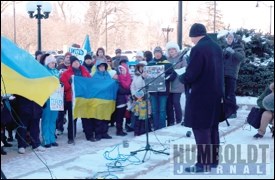As Ukraine teeters on the edge of economic and political collapse, members of Saskatchewan's large Ukrainian community watch with a mixture of alarm and interest.
"Absolutely helpless."
That's how Danylo Puderak, the executive director of the Saskatchewan Provincial Council of the Ukrainian Canadian Congress, described the feeling of watching the recent unrest in Kiev that left as many as 80 people dead.
Protests broke out in Ukraine in November after the government of Viktor Yanukovych, widely seen as pro-Russian, backed out of a prospective free trade deal with the European Union to pursue closer ties with Russia. The unexpected move caused immediate backlash that saw Kiev's Independence Square transformed into a virtual battleground and produced deadly clashes between police and protesters.
The pitched battles ended on Feb. 21 when Yanukovych was removed from power after signing an accord with his political opponents. Immediately after, Yanukovych fled and is now believed to be in Russia.
"It's the worst feeling in the world," Puderak said of watching the violence. "Here I am in my nice warm house, watching on my computer screen, looking at a square in Kiev where I've been many times. I was seeing fires, protesters, people being shot. I couldn't believe it."
Puderak would like to see the Saskatchewan and Canadian governments offer continued support to the protesters, whether it is financial, medical, or otherwise.
"They need to provide resources to help the people who have taken such a courageous step," he said.
Foreign Affairs Minister John Baird issued a statement on Feb. 18 condemning the violence, while Saskatchewan premier Brad Wall echoed those sentiments the following day.
"My colleagues and I stand in support of a free and democratic Ukraine, where freedom of expression and the rule of law are guaranteed," Wall said.
Ukraine finds itself in the middle of a geopolitical tug-of-war between Russia and the European Union, both of which hope to develop closer ties with the country of 46 million people. In a sign that Russia will not go quietly into the night, President Vladimir Putin put his country's military on alert on Feb. 26. While western Ukraine tends to be more pro-Europe, the eastern and some southern parts of the country, especially the Crimean penninsula, which was long a part of the Russian Empire and the Soviet Union, is more pro-Russia. To prove the point, armed gunmen took control of regional government buildings in Crimea on Feb. 27 and raised a Russian flag, stoking fears of an east-west split in Ukraine. Current estimates peg the number of Russian troops in Crimea at up to 6,000.
The developments in Ukraine are being watched closely in Canada because, with 1.2 million people, Canada has the third largest Ukrainian population in the world, after Russia and Ukraine itself. Tens of thousands of Ukrainians immigrated to Saskatchewan at the turn of the 20th century and, according to Statistics Canada's 2011 National Household Survey, more than 10 per cent of Saskatchewan's population claims Ukrainian heritage.
Marches in support of the protesters were recently held in cities across Canada, including in Regina on Feb. 23. One of the people in the crowd was Bob Bandurka, a Humboldt resident who is also a fourth generation Ukrainian. Since traveling to Ukraine in 2004 to serve as an election observer following the country's Orange Revolution, Bandurka has kept a close eye on his ancestral homeland and felt compelled to make the trip to Regina.
"I just wanted to go and show my support," he said. "No regrets about it at all."
While Bandurka was originally inclined to accept the democratic process and Yanukovych as leader, that all changed when protesters began to be killed.
"I was willing to give the benefit of the doubt until about two weeks ago," he said.
Like Puderak, Bandurka is hopeful that Canada will lend a helping hand - "you can't just let a country disintegrate," he said - but realizes that it will be years, if not decades, before Ukraine becomes the country he wants it to be, specifically a European-style democracy with closer ties to the EU.
Puderak, who still has family members living in Ukraine, had similar thoughts about the future.
"My hope is that we see a country on a path to a prosperous, democratic, open European state," he said. "A place with people confident in the future, confident the government will protect them. A place where people have opportunities in their homeland and have no need to leave."




